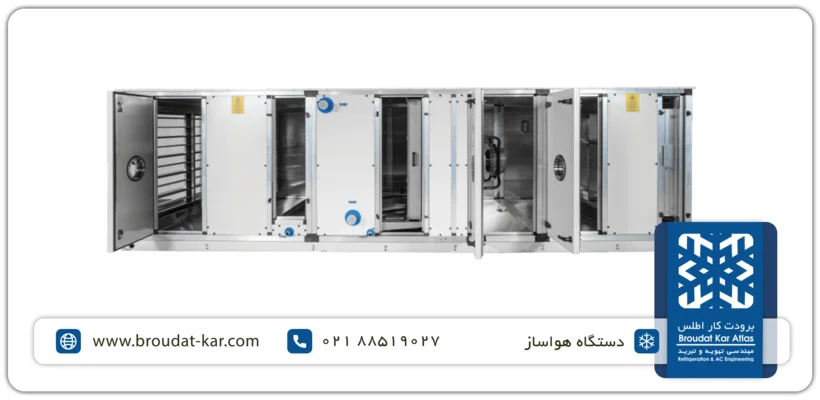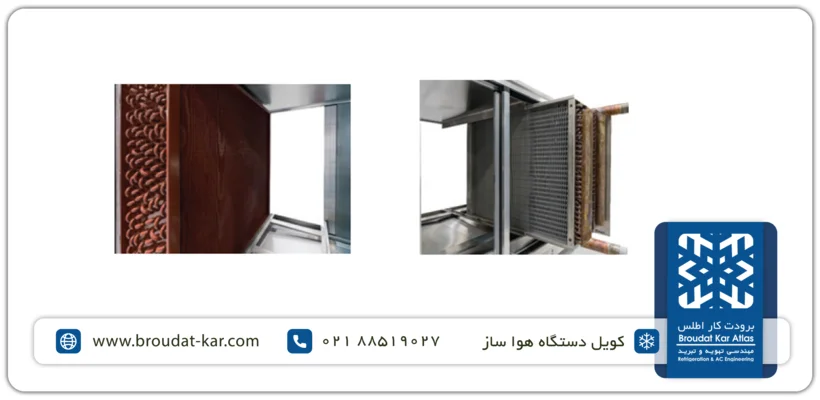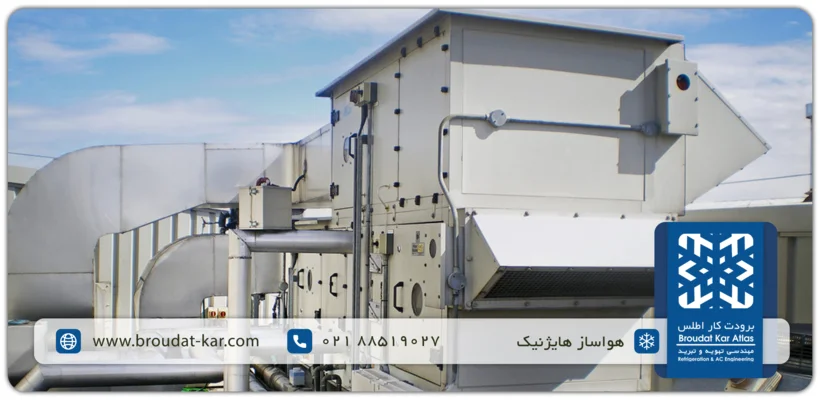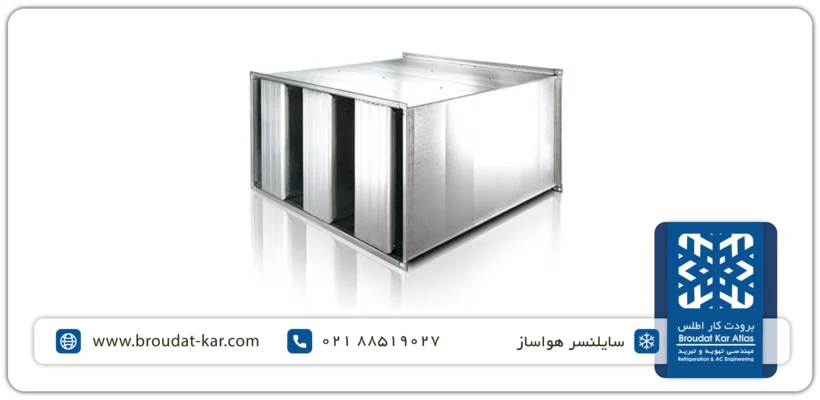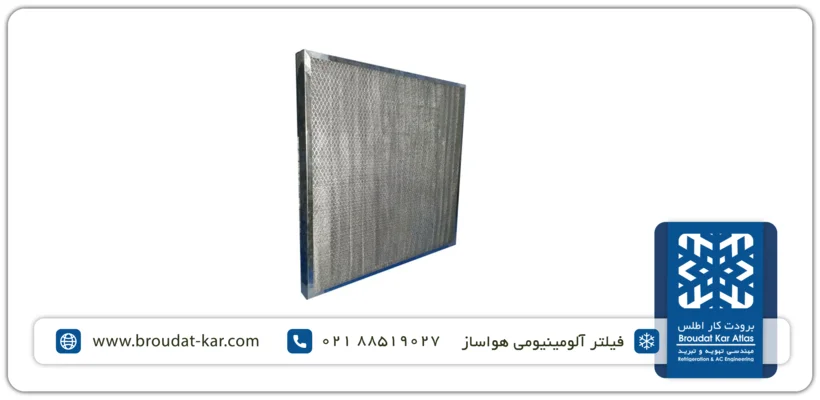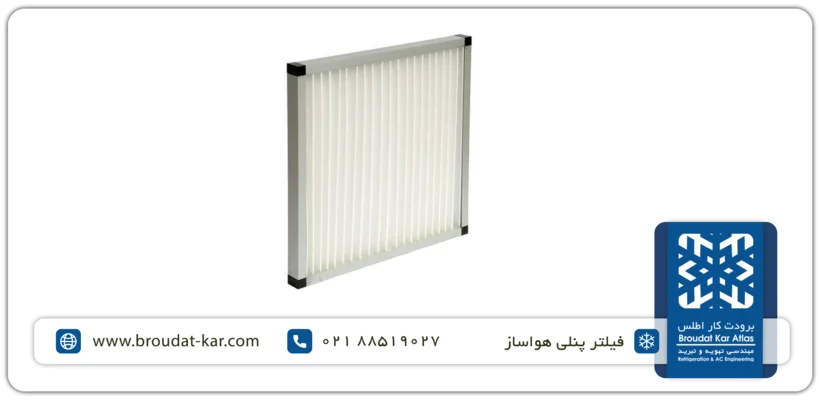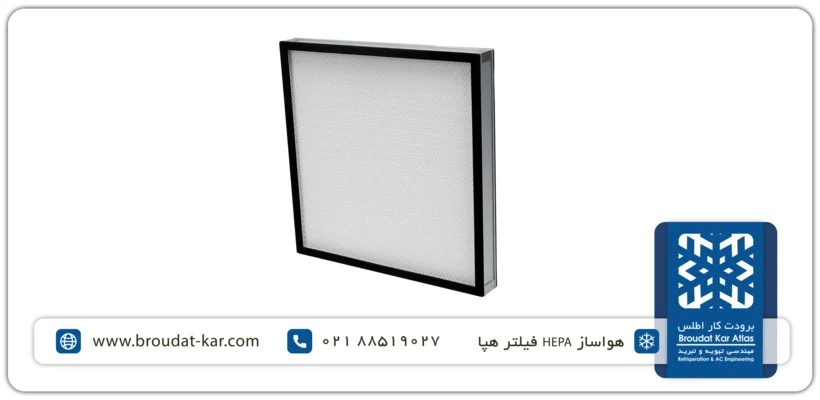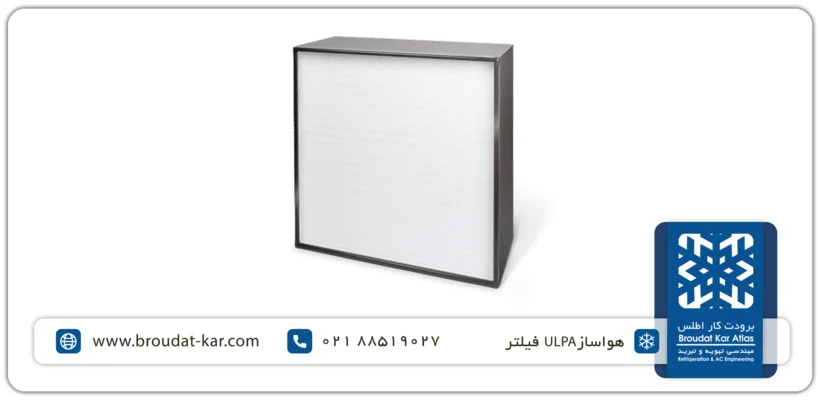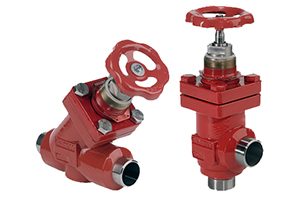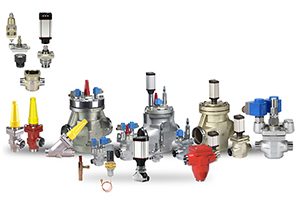What Is an Air Handling Unit (AHU)?
An air handling unit (AHU) is a comprehensive system designed to regulate and condition air within a space, offering heating, cooling, fresh air, and filtration as needed.
It often collaborates with other equipment like chillers, boilers, and cooling units to create an efficient air conditioning system. Industrial AHUs ensure precise air quality control through multiple filter stages and dampers for fresh and return air, typically requiring ducting within the designated areas.
How Does an Air Handling Unit (AHU) Work?
The air handling unit (AHU) operates through several key processes to meet the air conditioning requirements of different spaces:
Air Circulation
The AHU contains fans that circulate air into the designated area. The type and power of these fans depend on design factors and the number and type of filters.
Air Filtration
Various filter beds within the AHU, tailored to the space’s usage, ensure air quality. Filters range from aluminum and bag filters to HEPA and electrostatic filters.
Heating and Cooling
Coils within the AHU provide heating, typically supplied by a boiler or electric heaters. Cooling can be achieved through a cold-water coil connected to a chiller or a DX coil with a condensing unit.
Humidification and Dehumidification
Some AHUs include equipment to adjust air moisture levels, ensuring optimal indoor humidity.
Fresh Air Mixing
Fresh air is combined with return air from the interior to maintain air quality and prevent the buildup of stale or polluted air. AHUs that introduce only fresh air are known as Full Fresh air handling units.
AHUs are vital for maintaining indoor air quality, temperature control, and energy efficiency in commercial and industrial buildings. They can be customized to meet specific needs and play a crucial role in providing occupant comfort.
Complete control of pollutants, temperature, and air humidity in sanitary, commercial, and industrial spaces with the air handling unit from Atlas Refrigeration Company.
Types of Air Handling Units
Blow-Through AHU
– In blow-through air handling units, the blower pushes air through the mixing box, cooling and heating coils, and filters into the ducted network.
– This type is characterized by the air being blown directly into the ducting system.
Draw-Through AHU
– Draw-through air handling units, on the other hand, draw air through coils, filters, and mixing boxes towards the ducts.
– These units can be configured vertically or horizontally based on space requirements and design preferences.
Atlas Refrigeration Company offers customized air handling units tailored to specific project needs, ensuring optimal performance and efficiency.
Hygienic Air Handling Unit Overview
A hygienic air handling unit (AHU) is designed to maintain clean, sterile, and contaminant-free air, particularly in critical environments like healthcare facilities, clean rooms, laboratories, and food production facilities.Here are its key features:
Advanced Filtration
– Utilizes HEPA or ULPA filters to remove sub-micron particles, including bacteria, viruses, and allergens.
– Pre-filters are employed to capture larger particles and prevent clogging of HEPA/ULPA filters.
– Some units incorporate absorption filters to eliminate volatile organic compounds (VOCs) and odors.
Sterilization and Disinfection
– UV germicidal lamps are commonly used to disinfect the air by deactivating microorganisms like bacteria, viruses, and mold.
– Ozone generators may also be employed to neutralize odors and eradicate airborne microorganisms.
Sealed Construction
– Hygienic AHUs feature airtight construction to prevent the ingress of contaminants, ensuring the purity of the processed air.
Stainless Steel Components
– Stainless steel parts are utilized in areas prone to moisture exposure to prevent corrosion, contamination, and facilitate easy cleaning.
Drainage and Condensate Management
– Equipped with drain trays and effective condensate management systems to mitigate microbial growth and maintain air purity by managing moisture from cooling coils and interior surfaces.
Hygienic air handling units play a vital role in safeguarding indoor air quality, creating a safe and healthy environment for occupants, and ensuring compliance with stringent cleanliness standards.
Specifications of Atlas Refrigeration Company’s Hygienic Air Handling Unit
– Capacity: Available in models ranging from 2000 to 40,000 cubic feet per minute (CFM).
– Configuration: Can be designed in horizontal, vertical, and L-type configurations.
– Fan Placement: Options for fan placement include before the coil (Blow through) and after the coil (Draw through).
– Coil Options: Various cooling and heating water coils, electric heating coils, and evaporator coils (DX) are available, compatible with different refrigerants.
– Humidification Options: Electric and steam humidifiers (Steam Jacket) can be incorporated.
– Filter Selection: Offers a range of filter types with different efficiencies, including aluminum filters, washable stainless-steel filters, pleated filters, bag filters, HEPA filters, and active carbon filters.
– Evaporative Cooling: Options for evaporative cooling such as air washers (Class 6 & Class 8) with evaporation efficiency ranging from 60% to 95%, and Zent with cellulose and PP (polypropylene) pads with evaporation efficiency of 50% to 80%.
– Fan Customization: Blower, return, and exhaust fans available in centrifugal types (Centrifugal) with options for forward blade, backward blade, and plug (Plug backward curved), etc.
– Quality Construction: Constructed with high-quality galvanized sheet chassis featuring bolted connections and electrostatic paint.
– Hygienic Design: Features anodized aluminum column with standard connections and fittings, ensuring a smooth internal surface without negative slope to prevent adhesion, deposition, and emission of pollutants.
The air handling unit from Atlas Refrigeration Company is a smart choice for enhancing employee health, boosting productivity, and fostering business prosperity.
Components of an Air Handling Unit
Filters
Remove pollutants from incoming air, such as dust, pollen, allergens, and microorganisms, based on air quality requirements.
Fans
Transfer air within the unit, including supply fans, return fans, and exhaust fans. Variable frequency drives (VFD) may be used to control fan speed.
Coils
Copper tubes and aluminum fins used for heating or cooling air, including DX coils, cold water coils, hot water coils, steam coils, or coils with electric heaters.
Dampers
Control air flow through the unit, either manually or with motorized dampers that adjust air intake, exhaust, and return air.
Mixing Box
Some units have a mixing chamber to blend return air with fresh air.
Humidifiers and Dehumidifiers
Regulate humidity levels in spaces where precise humidity control is required.
Control System
Monitors and adjusts unit operation, typically including temperature and humidity sensors, controllers, and a programmable logic controller (PLC).
Drain Trays
Collect and remove water condensation from coils and interior components.
Silencers
Reduce noise produced by fans, dampers, and air flow within the unit.
The efficient functioning of these components ensures that the air handling unit delivers the desired air quality and conditions for the building it serves, with configurations tailored to specific design, usage, and environmental requirements.
Advantages and Disadvantages of Air Handling Units
AHU Advantages
- Air Quality Control: Multi-stage filtration removes pollutants, improving indoor air quality.
- Temperature and Humidity Control: Units regulate temperature and humidity for comfort and process requirements.
- Ventilation: Provides fresh air, reducing harmful gas accumulation and ensuring a safe environment.
- Customization: Units can be tailored to specific industrial, food, pharmaceutical, and other process needs.
Disadvantages
- High Initial Cost: Purchase and installation can be expensive, especially for customized units.
- Space Requirement: Units and associated ductwork occupy significant space, posing challenges in some buildings.
- Repair and Maintenance: Regular maintenance is crucial for efficiency and reliability; neglect can lead to increased costs and breakdowns.
- Noise: Poor placement and inadequate noise control measures can result in noisy operation.
In summary, air handling units offer significant advantages in environmental control and air quality but require careful consideration of costs, maintenance, and noise levels. Decision-making should be based on specific ventilation needs, regulatory requirements, and available budget.

Types of Filters in Air Handling Units and Their Uses
Aluminum Filter: Used as a pre-filter to capture airborne particles, washable and reusable.
Panel Filter: Commonly used for larger particles like dust, available in flat or pleated forms, cost-effective.
Bag Filter: Offers more surface area for air contact, effective for smaller particles, longer lifespan.
HEPA Filter: Highly efficient, removes 97.99% of particles ≥0.3 microns, ideal for hospitals, labs, and clean rooms.
ULPA Filter: Even more efficient than HEPA, captures particles ≥0.12 microns, used in ultra-clean environments like semiconductor and pharmaceutical facilities.
Activated Carbon Filter: Impregnated with activated carbon, absorbs odors, VOCs, and gases, commonly used for odor control in commercial kitchens and labs.
The choice of filter depends on specific application requirements, air quality standards, maintenance considerations, and budget constraints. Regular maintenance and replacement are crucial to ensure effective operation and maintain indoor air quality.
Factors Affecting the Price of an Air Handling Unit
- Capacity: Larger units with higher CFM ratings require more materials, equipment, and labor, leading to higher costs.
- Customization: Units tailored to specific needs, such as unique filtration or humidity control requirements, are typically more expensive.
- Filtration Rate: High-efficiency filters like HEPA or ULPA can increase costs compared to standard filters.
- Heating and Cooling Systems: Units with higher-capacity heating and cooling systems have larger coils and may be more expensive.
- Maintenance and Serviceability: Units designed for easy maintenance and service access may have higher upfront costs but can lead to long-term cost savings.
Other factors, such as brand, geographic location, and installation expenses, also contribute to the overall price. For an accurate estimate, consulting HVAC experts or engineers to evaluate project-specific requirements is recommended.
Atlas Refrigeration Co. Comprehensive Air Handling Unit Services
Atlas Refrigeration Company offers a comprehensive suite of services for all types of air handling units, ensuring excellence from consultation to after-sales support:
- Expert Consultation: Our HVAC and refrigeration specialists provide tailored advice to understand your project needs and guide you in selecting the right air handling unit.
- Design: Leveraging advanced technology and industry expertise, we design air handling units that prioritize efficiency, stability, and performance, focusing on air quality, temperature control, and energy savings.
- Installation: From concept to reality, we ensure a seamless transition by manufacturing and installing air handling units according to approved designs, guaranteeing precision and reliability.
- After-sales Service: Our commitment extends beyond project completion. We provide ongoing support, offering assistance, guidance, and solutions to address any concerns or adjustments you may require.
At Atlas Refrigeration Company, our dedication to excellence ensures that your air handling unit requirements are met with the highest standards of quality and satisfaction.
Concluding Remarks on Air Handling Units
Maximizing comfort, efficiency, and air quality is paramount in any environment, and air handling units (AHUs) play a pivotal role in achieving these goals. From standard units for commercial spaces to specialized ones for sensitive environments like hospitals and clean rooms, AHUs offer tailored solutions to diverse needs.
Regardless of the application, AHUs perform essential functions like conditioning air, filtering out pollutants, regulating temperature and humidity, and distributing air optimally. With advanced features such as energy-efficient components, precise controls, and customizable options, AHUs ensure optimal performance while prioritizing comfort and safety.
At Atlas Refrigeration Company, we go beyond mere service provision – we become strategic partners in your quest for superior air handling. From consultation to design, installation, and ongoing maintenance, we’re committed to delivering excellence at every step. With Atlas, rest assured that your AHU projects are in capable hands, ensuring quality and satisfaction throughout the journey.
No. An AHU does not produce heating or cooling on its own; instead, it receives fresh or return air, filters it, adjusts its temperature and humidity, and then delivers it to the space. Therefore, it functions as a distributor of conditioned air.
Fan coil units are typically used to condition a limited area, such as a single room, while AHUs are designed to supply and control air for multiple zones or the entire building, with a much higher air handling capacity.
Industrial AHUs are built with higher capacity, specialized filters, larger coils, and the ability to precisely control parameters such as temperature, humidity, pressure, and air quality. They are commonly used in warehouses, factories, and large halls.
By introducing fresh air, regulating temperature and humidity, filtering particles, and mixing return air with fresh air, an AHU delivers optimal air conditions to the space—without directly generating heating or cooling.
An AHU typically includes a fan or blower, filters, cooling and heating coils, humidifiers or dehumidifiers, a mixing chamber, an insulated casing, and sound attenuation and control elements
To make better use of indoor space, provide easier access for maintenance, and reduce noise in occupied areas, AHUs are often installed on rooftops or in dedicated mechanical rooms.
Yes. An AHU can balance indoor pressure levels. In industrial buildings especially, proper adjustment of the air intake and exhaust can prevent the creation of negative pressure.
Related posts
Air Handling Unit
Ammonia Valves | Applications of Ammonia and Operating Conditions Ammonia valves play a crucial role in regulating the refrigerant within
Valves and Control Devices in Ammonia and Freon Refrigeration Systems The variety of valves and control devices in refrigeration systems
What is Ducted Split? A ducted split system, also known as a duct split, is an HVAC configuration that
What is Air Conditioning? Air conditioning encompasses the regulation of temperature, humidity, and air quality within indoor spaces, aiming to
